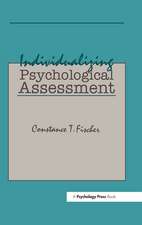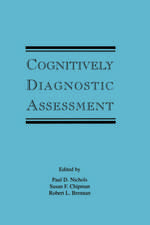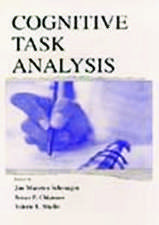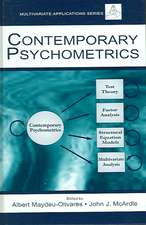Transforming the Measurement of Learning and Teaching in Higher Education
Autor Alan Bain, Nicholas Drengenbergen Limba Engleză Hardback – 11 mar 2016
| Toate formatele și edițiile | Preț | Express |
|---|---|---|
| Paperback (1) | 302.01 lei 6-8 săpt. | |
| Taylor & Francis – 7 mar 2016 | 302.01 lei 6-8 săpt. | |
| Hardback (1) | 997.90 lei 6-8 săpt. | |
| Taylor & Francis – 11 mar 2016 | 997.90 lei 6-8 săpt. |
Preț: 997.90 lei
Preț vechi: 1216.95 lei
-18% Nou
Puncte Express: 1497
Preț estimativ în valută:
190.94€ • 199.36$ • 158.03£
190.94€ • 199.36$ • 158.03£
Carte tipărită la comandă
Livrare economică 05-19 aprilie
Preluare comenzi: 021 569.72.76
Specificații
ISBN-13: 9781138118881
ISBN-10: 1138118885
Pagini: 188
Ilustrații: 17
Dimensiuni: 152 x 229 mm
Greutate: 0.39 kg
Ediția:1
Editura: Taylor & Francis
Colecția Routledge
Locul publicării:Oxford, United Kingdom
ISBN-10: 1138118885
Pagini: 188
Ilustrații: 17
Dimensiuni: 152 x 229 mm
Greutate: 0.39 kg
Ediția:1
Editura: Taylor & Francis
Colecția Routledge
Locul publicării:Oxford, United Kingdom
Public țintă
Professional and Professional Practice & DevelopmentCuprins
Contents
Foreword
Acknowledgements
Chapter One Is There Learning in Learning Analytics?
Introduction and Overview
How is Learning Analytics Done?
What Are We Doing and Why?
How Do People Really Use Data?
The Education Gap
Proximal and Distal Data
Organizations, Scale and Networks
Surveillance and Ethics
Smarter Tools, Edge Technology
The Maturity of a Young Field
Takeaways
Chapter Two Creating the Context for Emergent Feedback
Introduction and Overview
The Problem
Understanding Context
A Context for Learning and Teaching
Comparability
Models of Learning
Educational Productivity Research
Visibility
Professional Control
The Scope of the Learning and Teaching Context
Implications for Emergent Feedback and Learning Analytics
Takeaways
Chapter Three Emergent Feedback: The New Learning Analytics
Introduction and Overview
Understanding Emergent Feedback
Emergent Feedback in Action
Emergent Feedback at Scale
Attribution
Technology
Clarifying
Ultima Thule – The Ultimate Goal
Chapter Four Agency
Introduction and Overview
What is Agency?
Networked Agency: Actor Network Theory
Agency without professional control
Why is education different?
The Tardean Turn
Gabriel Tarde, agency and scale
Scale
Takeaways
Chapter Five The Emergent Feedback Organization
Introduction and Overview
Characteristics of an Emergent Feedback Organization
Absence of Professional Control
A Distal Schema
The Agency of Hierarchy
No Emergent Feedback
External Forces
Busy with Distal Data
The Emergent Feedback Organization in Action
Professional Control
Agency
Self-Similar Distributed Leadership
Emergent Feedback
Dynamic Change
Implications
Takeaways
Chapter Six The Ethics of Emergent Feedback
Introduction and Overview
Ethical Issues: Current Perspectives
Getting it Right – Ethical Utility
Best Practice Commitments
Accuracy and Transparency
Rights and Ethical Process
Ethical Themes in an Emergent Feedback Organization
Professional Codes of Ethics – A Point of Comparison
Implications: Making a Different Case
Takeaways
Chapter Seven The Technology of Emergent Feedback
Introduction and Overview
Technology in Education
Thinking Differently About Technology – Actual and Virtual
The Actual
The Virtual
Conway’s Law
The Principles of Professionally Controlled Technologies: A True ‘Virtual’
Agent-Based Development
Design Methodology
Smarter Toolkits
Implications: New Technologies
Takeaways
Chapter Eight Change
Introduction and Overview
The Proximal Issue
State of the Art
Paradigm Building
Crossing the Border
Implications for Learning Analytics
Expecting the Incomplete
Takeaways
Chapter Nine Where to from Here?
Compatibility
The Maturity Index
Culture/Process
Data/Reporting/Tools
Investment
Expertise
Governance/Infrastructure
Sameness and Competition
Changing the Game
Potential Differentiators
Final thoughts
Takeaways
Index
Foreword
Acknowledgements
Chapter One Is There Learning in Learning Analytics?
Introduction and Overview
How is Learning Analytics Done?
What Are We Doing and Why?
How Do People Really Use Data?
The Education Gap
Proximal and Distal Data
Organizations, Scale and Networks
Surveillance and Ethics
Smarter Tools, Edge Technology
The Maturity of a Young Field
Takeaways
Chapter Two Creating the Context for Emergent Feedback
Introduction and Overview
The Problem
Understanding Context
A Context for Learning and Teaching
Comparability
Models of Learning
Educational Productivity Research
Visibility
Professional Control
The Scope of the Learning and Teaching Context
Implications for Emergent Feedback and Learning Analytics
Takeaways
Chapter Three Emergent Feedback: The New Learning Analytics
Introduction and Overview
Understanding Emergent Feedback
Emergent Feedback in Action
Emergent Feedback at Scale
Attribution
Technology
Clarifying
Ultima Thule – The Ultimate Goal
Chapter Four Agency
Introduction and Overview
What is Agency?
Networked Agency: Actor Network Theory
Agency without professional control
Why is education different?
The Tardean Turn
Gabriel Tarde, agency and scale
Scale
Takeaways
Chapter Five The Emergent Feedback Organization
Introduction and Overview
Characteristics of an Emergent Feedback Organization
Absence of Professional Control
A Distal Schema
The Agency of Hierarchy
No Emergent Feedback
External Forces
Busy with Distal Data
The Emergent Feedback Organization in Action
Professional Control
Agency
Self-Similar Distributed Leadership
Emergent Feedback
Dynamic Change
Implications
Takeaways
Chapter Six The Ethics of Emergent Feedback
Introduction and Overview
Ethical Issues: Current Perspectives
Getting it Right – Ethical Utility
Best Practice Commitments
Accuracy and Transparency
Rights and Ethical Process
Ethical Themes in an Emergent Feedback Organization
Professional Codes of Ethics – A Point of Comparison
Implications: Making a Different Case
Takeaways
Chapter Seven The Technology of Emergent Feedback
Introduction and Overview
Technology in Education
Thinking Differently About Technology – Actual and Virtual
The Actual
The Virtual
Conway’s Law
The Principles of Professionally Controlled Technologies: A True ‘Virtual’
Agent-Based Development
Design Methodology
Smarter Toolkits
Implications: New Technologies
Takeaways
Chapter Eight Change
Introduction and Overview
The Proximal Issue
State of the Art
Paradigm Building
Crossing the Border
Implications for Learning Analytics
Expecting the Incomplete
Takeaways
Chapter Nine Where to from Here?
Compatibility
The Maturity Index
Culture/Process
Data/Reporting/Tools
Investment
Expertise
Governance/Infrastructure
Sameness and Competition
Changing the Game
Potential Differentiators
Final thoughts
Takeaways
Index
Notă biografică
Alan Bain is Professor of Innovation in Learning, Teaching, and Technology in the Faculty of Education at Charles Stuart University, Australia.
Nicholas Drengenberg is Academic Secretary and Manager in the Office of Academic Governance at Charles Stuart University, Australia.
Nicholas Drengenberg is Academic Secretary and Manager in the Office of Academic Governance at Charles Stuart University, Australia.
Descriere
Revolving around the real work done on a daily basis by those in the field, it describes how organizations can be better structured for quality learning, showcases new tools for gathering emergent feedback, and demonstrates how that feedback can be used effectively across organizations.
















